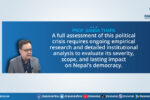KATHMANDU: Nepal’s economic growth is projected to accelerate to 5.1 percent in FY 2025, up from 3.9 percent in FY 24.
This growth is expected to be driven by increased tourist arrivals, higher hydropower production, and improved paddy yields, according to the World Bank’s latest report, Nepal Development Update: International Migration and Well-being in Nepal, released today.
The private sector is anticipated to play a significant role in this growth, benefiting from the central bank’s easing of monetary policy and regulatory requirements.
The economy is projected to grow by 5.5 percent in FY 26. However, the report outlines several risks to this outlook, including vulnerabilities in the financial system, such as rising non-performing loans that could restrict private sector credit growth.
Other risks include potential policy discontinuity that may deter investment, delays in capital spending budget execution affecting infrastructure development, and regional instability that could disrupt tourism and domestic demand.
“Nepal’s economy is on a gradual recovery path,” said Prof. Dr. Shiva Raj Adhikari, Vice Chairman of the National Planning Commission.
“Our focus on enhancing capital expenditure, particularly by completing nearly finished projects, alongside reforms in the budgetary process, will strengthen macroeconomic stability, boost domestic productivity, and create more jobs.”
Shocks in migrant-receiving countries, such as those in the Gulf Cooperation Council and Malaysia, could also impede growth by impacting international remittances, which are vital for household consumption, poverty reduction, and human capital development.
The report notes that while migration offers opportunities, it is often costly and fraught with challenges.
The report emphasizes the need for key policy interventions to build an inclusive migration management system aimed at maximizing the benefits of migration.
“Maintaining growth momentum is crucial for Nepal’s development,” said David Sislen, World Bank Country Director for Maldives, Nepal, and Sri Lanka.
“This requires continued reform in critical areas such as infrastructure, governance, and human capital development, along with creating an environment that encourages and supports the private sector.”
An inclusive migration management system would promote a transparent recruitment process, better prepare migrants for work abroad, ensure their safety and mobility in foreign labor markets, and facilitate long-term skills development and destination diversification.
The Nepal Development Update, produced biannually, offers a comprehensive analysis of significant economic developments over the past year, placing them in a longer-term and global context.









Comment